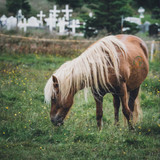If you are the owner of an aging horse, you may have asked yourself “Do I need to change my horse’s diet” or “Have the nutritional requirements for my senior horse changed”? There is currently no set criteria that define a “senior” horse. However, it is commonly thought that a horse over 20 years of age is considered a senior horse.
There are other factors to consider before you determine if your horse is at a senior age, and if they could benefit from nutritional supplements. They are:
- Chronologic, or the number of years of life from birth
- Physiologic, which relates to the decline in physiologic function (see below)
The nutritional requirements of a senior horses are different from other classes of horses, because of changes that take place to their metabolic and digestive efficiency. The onset of age- related diseases effects nutrient requirements and the nutritional management of senior horses.
Horses are unique individuals and just like people, they undergo a variety of physical changes with age. As horses age they also undergo physiological changes and are predisposed to certain age-related diseases.
Some common physical signs of aging and common diseases senior horses develop are:
- Loss of weight and decrease in body condition
- Loss of muscle mass over the top line
- Sway Back
- Hollow grooves above the eyes
- Graying hair coat
- Dental diseases
- Equine Metabolic Syndrome (including insulin resistance, cresty necks and laminitis)
- Equine Cushing’s Disease (pituitatry adenomas)
- Kidney and Liver Dysfunction
- Arthritis
- Colic
Horses that are missing teeth or have poor dentition must rely on alternative sources of fiber other than pasture and long-stem hay because their ability to graze and chew is limited. Senior Snax is a new treat developed with the needs of the senior horse in mind.
Most senior horses benefit from feeds that are designed specifically for older horses that are easy to chew and are highly digestible. Feeds that contain digestive aids such as yeast cultures, prebiotics and probiotics may help increase digestive efficiency in senior horses. Supplemental Vitamin C may benefit the immune system of senior horses. Supplementation with fat, such as vegetable oil, helps maintain body condition without risk of digestive disorders associated with sugar and starch.
Other considerations when caring for a senior horse include:
- Offer meals frequently throughout the day
- Never exceed 5 lbs in any single meal
- Separate senior horses from other horses during feeding to ensure their access to feed
- Keep a regular deworming schedule
- Remember to vaccinate
- Maintain proper hoof care
Senior horses should be evaluated thoroughly by a veterinarian to diagnose age-related diseases and appropriate diets and feeding programs should be incorporated based on a complete physical exam.
Nutrition for geriatrics, or old horses with age-related diseases, has become more prevalent because horses are living longer and more data is available on nutritional risk factors for diseases and digestive disorders. LV Performance is committed to bringing you the best supplements available on the market today. Helping you, help your equine friend live a healthier and happier life.

